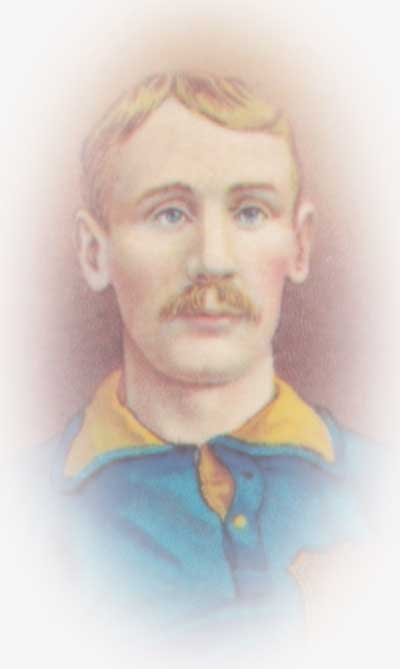 Goalkeeper
Harry Bromage's displays in the colours of Leeds City were among the highlights
of the club's inglorious 15-year existence. They also represented one
of the most enduring themes: Bromage was there from the early days, keeping
goal for the Peacocks in their first
game in the Football League in September 1905, and he outlasted all
his contemporaries, remaining at Elland Road until 1911.
Goalkeeper
Harry Bromage's displays in the colours of Leeds City were among the highlights
of the club's inglorious 15-year existence. They also represented one
of the most enduring themes: Bromage was there from the early days, keeping
goal for the Peacocks in their first
game in the Football League in September 1905, and he outlasted all
his contemporaries, remaining at Elland Road until 1911.
His move to Leeds gave the keeper plenty of opportunities to shine;
City's rearguard was of modest stock and on many occasions the custodian
was all that stood between the Peacocks and the heaviest of thrashings.
'Bromage gave a really fine exhibition, and but for his clever goalkeeping
the home team would have won by a larger margin,' was all too typical
a quote from a local newspaper after a 2-0 defeat at Bradford Park Avenue
in April 1909.
Despite a perpetual lack of defensive cover from his team mates, Bromage
never lacked commitment to the cause at any time during his lengthy stay
at Elland Road. He was the second player to make 100 league appearances
for Leeds City, following in the footsteps of Fred
Parnell, and he broke the winger's appearance record when he made
his 105th start in February 1910. By the time of his final game for the
club in April 1911, he had played more league matches than any other City
player (143), though Stan Cubberley and Billy
McLeod both overtook his total before the end of the season.
With his hangdog expression, drooping moustache and ubiquitous flat
cap, Bromage cut a dour, stereotypically Northern figure, but his displays
between the sticks for City brought colour and excitement to the Peacocks'
early years.
He was neither the most spectacular nor the flashiest of keepers, but
he was a brave and plucky custodian. He had to be, for he played in an
era when burly centre-forwards habitually tested the mettle of keepers
with vigorous tenacity, thinking nothing of laying them out with an aggressive
airborne charge. Bromage regularly risked life and limb between the sticks
for City, seemingly oblivious to the risks he took. There is no sound
way of establishing the point, but his courage and commitment might have
made the keeper the first genuine Elland Road folk hero. One of his favourite
tricks was to launch a swift counter-attack with a sharp throw out to
a team mate after catching the ball from a cross, a move that was not
common among other keepers of the day.
Bromage faced occasional criticism for a penchant for reckless sprints
out of his area to confront opposing forwards as they ran in on goal,
but it was an excusable flaw, given the lack of protection he was often
afforded by somewhat limited full-backs. It was always a toss up whether
Bromage would get the ball or not, but it made for some exciting moments.
back to top
Henry 'Harry' Bromage was born in Derby on 17 May 1879, the eldest of
John and Eliza Bromage's eight children. His father was a brickmaker,
but the Bromages were a renowned footballing family: Harry's uncle was
a goalkeeper with Derby County, while his five brothers all became professional
or semi-professional players. Bill played for Sheffield United and Doncaster
Rovers, going on to be a trainer at Derby County; George played for Sheffield
United, Jack for Chesterfield, Enos for Derby County and West Bromwich
Albion, and Joe was a semi-pro with Denaby United, Loughborough Corinthians
and Gainsborough Trinity.
Local club Derby County, home of the legendary Steve Bloomer, were founder
members of the Football League and one of the strongest teams in the First
Division, enjoying a series of exciting cup runs around the turn of the
century. They acted as a beacon for the football-loving Bromage boys.
For a couple of years around 1890, Harry's uncle, Enos Bromage, was
a reserve goalkeeper with County. That gave Harry the opportunity to
enjoy the atmosphere behind the scenes at a big club and sparked his
interest in the game. He made his debut for the Rams on Boxing Day 1899
against Glossop.
Harry earned a living as a brickburner, but from an early age he was
a keen footballer and, inspired by Enos, he also became a keeper, starting
his career in junior football with Derby Constitutional. In 1898, undeterred
by his uncle's experience (Enos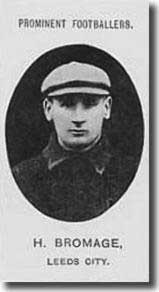 only managed 17 appearances for the Rams before disappearing into the
lower leagues), Harry became deputy to the famous Jack 'String' Fryer,
who played in three FA Cup final defeats for the Rams between 1898 and
1903, including a record 6-0 reverse against Bury in the last of those
finals, when he was carrying an injury.
only managed 17 appearances for the Rams before disappearing into the
lower leagues), Harry became deputy to the famous Jack 'String' Fryer,
who played in three FA Cup final defeats for the Rams between 1898 and
1903, including a record 6-0 reverse against Bury in the last of those
finals, when he was carrying an injury.
Bromage loved his time at the Baseball Ground, but he failed to make
an impact and feared he would never get a real chance with Fryer monopolising
the position. After five league appearances in three seasons, he moved
on to Second Division Burton United in 1901.
United had been formed originally as Burton Swifts, incorporated into
the Football League when the Second Division was created in 1892. They
finished bottom of the table at the end of the 1900/01 season and had
to apply for re-election. Prior to the vote, the Swifts amalgamated with
near neighbours Burton Wanderers to form Burton United, who were duly
admitted to the league.
Harry's change of employer brought regular first-eam football and he
played 67 times over the next four seasons for a team that habitually
struggled in the lower reaches of Division Two.
They ended the 1904/05 season second bottom and had to apply again
for re-election. However, Bromage proved his worth with a string of
decent performances in a disappointing campaign. His reputation attracted
the attention of the men who ran Leeds City, newly elected to the Football
League, and they gave him the chance of a move to pastures new for the
1905/06 season.
City came top of the voting at the League's AGM with 26 votes and originally
they were set to replace Burton, who got only 10 votes. The Staffordshire
club were given a reprieve with the extension of the League from 36
to 40 clubs and they were voted back into the Second Division in a subsequent
election.
Bromage's signature represented a real feather in the cap for Leeds City,
a club that aspired to great things. Linesman reported as follows in the
Leeds Mercury on 30 May 1905: 'For the responsible position of
goalkeeper, a particularly happy choice has been made. Throughout last
season Bromage played very cleverly with Burton United, giving clear proof
of his ability in front of the net. Indeed, he had no superior in the
Second League.'
The keeper was not among complete strangers at his new club: Burton
centre-forward Fred Hargraves was another
new arrival at Elland Road. Former Derby winger Fred Parnell was also
a new signing for City, but the paths of the pair had never crossed
at County, Bromage leaving a couple of seasons before Parnell signed
for the Rams.
Bromage performed well on his debut for the Peacocks, on 2
September away to Bradford City, though he could not prevent a 1-0
defeat. The Yorkshire Post: 'Bromage more than once proved himself
a capable defender of goal' and 'displayed skill and judgement between
the Leeds posts'.
That first season it took a while for City to get into their stride.
They lost their first two games, before drawing their third and then
finally getting a win at the fourth attempt, but thereafter their fortunes
picked up considerably and the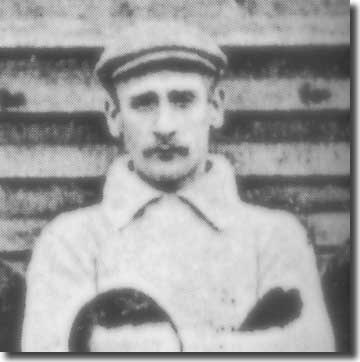 team ended the campaign in sixth spot.
team ended the campaign in sixth spot.
Bromage quickly established himself as a stalwart of the side, consistent,
safe and reliable. He even deputised as captain in the absence of the
injured Dick Ray when City faced Mexborough
Town in the FA Cup in November.
The keeper enjoyed an excellent season, missing just three games and
keeping eleven clean sheets. He earned some good reviews, including this
from Nimrod in the Leeds Mercury after the 1-1 draw at Grimsby
on 17 March: 'Bromage again gave a remarkable display in goal.'
City signed Jack Whitley from Stoke as
goalkeeping cover in April, and Bromage made way for him for three games
at the end of the season, but he was back as first choice for the
following campaign. Unfortunately the Peacocks could not build on
their promising start and had to be content with a mid-table position.
back to top
Again Harry Bromage was a star performer, earning the plaudits of the
critics right from the off. After the opening day draw with Bradford City,
the Leeds Mercury's Flaneur contrasted Bromage favourably with
the famous Bradford custodian, Willie 'Fatty' Foulke, dismissing the veteran
as ponderous by comparison: 'It brought out the best qualities of the
Leeds City goalkeeper, Bromage, whose magnificent defence was perhaps
the outstanding feature of the match. Bromage could not possibly prevent
Smith's goal, but he stopped everything else in the most brilliant fashion,
and whether he rushed out or remained between the posts he always did
the right thing. Leeds City need look no further for a goalkeeper.'
Bromage's bravery inevitably led to the occasional injury problem and
he missed a couple of games in September 1906. However, he was soon
back and building himself a reputation as a specialist when it came
to facing penalties.
He stopped a spot kick by Grimsby's Macgregor to inspire a 4-3 win on
13 October, City's second victory of the campaign. At the end of November
he blocked another penalty by Jones of Wolves, though the ball found its
way into the net. There was a similar outcome at the beginning of December
when he fended off another spot kick at Blackpool, with Scott scoring
from the rebound.
He saved yet another penalty at Gainsborough on 8 December, although
City went down by a single goal.
The Leeds Mercury reported on an outstanding performance: 'Leeds
had one stroke of luck before the interval, for after Holmes had scored
for Trinity as the result of a splendid centre by Northay, the home team
were awarded a penalty for a foul by Henderson,
and this was magnificently saved by Bromage ... The Leeds City goalkeeper
played a splendid game throughout, though in endeavouring to prevent the
goal scored by Holmes he collided with that player, and suffered from
the injury throughout the remainder of the game. At one stage, indeed,
Freeborough had to act as his substitute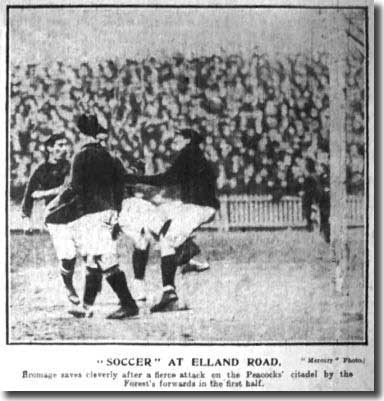 between the posts ... As usual, Bromage was the outstanding figure on
the side, and the defeat could not be attributed to any weakness in goal.'
between the posts ... As usual, Bromage was the outstanding figure on
the side, and the defeat could not be attributed to any weakness in goal.'
On 15 December, Bromage's reputation went before him, intimidating Stockport's
Waters, who blasted his spot kick high over the bar as City pulled off
a blistering 6-1 victory.
The keeper crowned a marvellous month with another splendid display at
Hull just before Christmas, as reported by Olympian in the Mercury:
'Bromage was in wonderful form from start to finish. It was reminiscent
of his doings in the match at Hull last season, and he undoubtedly saved
Leeds from a heavy beating ... Shot after shot was rained in on Bromage,
who, however, stood it all like a hero.'
He gave a tremendous performance in the FA Cup at Bristol City in January
and 'produced a series of marvellous saves in a breathtaking ten-minute
spell of intense Bristol pressure when he saved shots from all angles
... Bristol, a class above Leeds, looked set for a huge score but were
foiled by Bromage's heroics time after time.' Unfortunately, Harry had
little protection and the Peacocks were thrashed 4-1.
The keeper had a shaky time in the New Year and was dropped for a couple
of games in February, prompting fans and journalists to voice their criticism
of the Selection Committee. However, he was soon back at his post and
was ever present over the final twelve games, keeping four clean sheets.
City recovered from their mid-season slump, with the goals of new centre-forward
Billy McLeod promising better times to come.
Bromage was still first choice at the start of the 1907/08
season, but lost his place after shipping six goals at Derby on 19
October. City's management had secured the services of the highly rated
Tom Naisby from Sunderland and Bromage was exiled
to the reserves.
Nimrod in the Mercury: 'The critics certainly looked forward to
the appearance of Naisby in goal with some curiosity, and there were those
who would have quickly said bitter things at the expense of the management
for having the temerity to displace Bromage had Naisby failed to make
a satisfactory debut. Bromage's ability is well known; he still has the
skill, and one must sympathise with him on having so many goals scored
against him of late. But he is not primarily to blame, for it must be
borne in mind that the defence has not been above reproach, particularly
in the wing half-back positions, and the backs have not been too steady.'
back to top
A solitary appearance in the penultimate game of that season was all
that Bromage could manage until he was recalled to the team in the spring
of 1909. By now, original City secretary-manager Gilbert
Gillies had departed the scene, replaced by Frank
Scott-Walford in March 1908 and the new man stood by Naisby for
most of the campaign.
However, when Bromage earned his recall, he made the most of the opportunity,
keeping a clean sheet twice in the four games he played. He was suddenly
and firmly back in favour, earning praise for some fine displays. The
Leeds Mercury headlined with "Bromage in form" after the closing game
of the season, a 2-0 defeat at Bradford Park Avenue 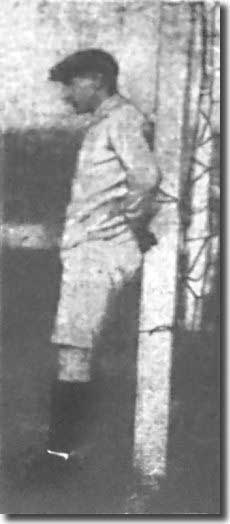 on
Tuesday, 27 April 1909.
on
Tuesday, 27 April 1909.
The custodian, now in his 30th year, was reinstated as automatic choice
for the 1909/10 season, cementing
his position with some fine early displays. 'Bromage was as safe as ever'
and 'Bromage kept a magnificent goal, and on leaving the field he received
a great ovation from an enthusiastic crowd,' were two typical quotes.
It was a depressing campaign for the club, which struggled against re-election
for many months. City suffered the poorest defensive record in the division
(80 goals conceded in 38 league games), though they came good with a late
run.
Harry Bromage was generally considered to be the best performer in a
hard pressed and struggling team - 'Bromage was magnificent throughout
the game, but even a Bromage cannot do the impossible.' A run of six points
from eight as March gave way to April saved both their blushes and their
Second Division status.
The custodian's sustained consistency had finally seen off the challenge
of Tom Naisby, who departed Elland Road in the summer of 1910 for Luton
Town. 20-year-old Tony Hogg was given a chance at the start of the
new season, playing in the first three games, each of which ended
in defeat. That was enough for the City regime and they quickly reverted
to their tried and trusted favourite.
Bromage was reinstated for the trip to Huddersfield on 24 September 24,
though he 'was not quite the Bromage we are accustomed to see', according
to Wanderer in the Leeds Mercury. He retained his place the following
week against Birmingham and it took a penalty to beat him as City secured
their first point of the season. A week later the Yorkshire Post
claimed that the keeper 'gave one of his best displays' away to West Bromwich
Albion.
He was now firmly back in harness and enjoyed a fine season, his last
for City as it turned out. He gave a string of high class performances
through a long and testing winter and reached new heights in the spring.
He excelled against Gainsborough Trinity in March 1911, as reported by
Wanderer in the Mercury: 'He had practically nothing to do in the
first half, but after the interval he was sorely pressed. What are commonly
called stinging shots were few and far between, but those long dropping
shots and accurately placed corner kicks, which must be the bane of a
goalkeeper's life, were as common as lost golf balls. In the last few
minutes the popular custodian saved a penalty and this was the crowning
effort of a really fine forty-five minutes' work.'
Bromage followed up with a clean sheet as City beat promotion-chasing
Bolton a week later. He was rewarded for his efforts when City held a
benefit game for him, on Easter Monday against Burnley at Elland Road.
The contest had originally been arranged for 11 March, but the Turf Moor
club had to cry off due to FA Cup commitments against Bradford City, and
the game was rearranged for the 27th of the month.
City's management lodged a claim of £72 against Burnley for the postponement,
though the Football League decreed that Burnley should pay damages of
just £27 16s.
The game kicked off late in an experimental move to pull in a bigger
attendance. It was a dismal failure in that respect, attracting just
5,500 spectators, in stark contrast to the previous Saturday when 15,000
fans paid to watch the win over Bolton. Bromage did have the satisfaction
of keeping another clean sheet and a guaranteed pay out of £500, a welcome
reward after his years of service in the Elland Road cause.
A couple of weeks later the keeper played his 143rd and final league
game for City. The day ended unhappily with Chelsea winning 4-1 as Bromage
was left badly exposed in the second half by a tiring defence. It was
a sad way to end a six-year association with the Citizens.
City already had the young and potentially very good Tony Hogg waiting
in reserve, and in May, Frank Scott-Walford signed the promising Irishman,
Leslie Murphy, from Belfast Celtic. Content that
the two men provided adequate goalkeeping cover, the board sanctioned
the release of 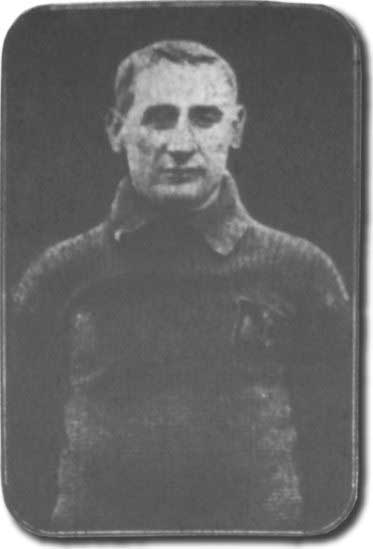 Bromage
at the end of the season. He departed for Midland League outfit Doncaster
Rovers, along with City's reserve inside-forward Tommy
Astill, leaving their erstwhile colleagues to a dire struggle against
the spectre of re-election during the campaign that followed. At Doncaster,
Harry was reunited with brother Bill, who was his new captain, as well
as a regular contributor of goals from his position on the wing.
Bromage
at the end of the season. He departed for Midland League outfit Doncaster
Rovers, along with City's reserve inside-forward Tommy
Astill, leaving their erstwhile colleagues to a dire struggle against
the spectre of re-election during the campaign that followed. At Doncaster,
Harry was reunited with brother Bill, who was his new captain, as well
as a regular contributor of goals from his position on the wing.
Doncaster had been elected to the Football League in 1901, but returned
to the Midland League in 1903 when they failed to gain re-election. They
re-entered the Second Division for the 1904/05 season, but finished last
with eight points and were demoted once more.
They were a much stronger force on the non-League scene - they finished
3rd in the Midland League in 1911, a feat they repeated after the addition
of Bromage in 1912.
Among the other major forces in the competition were Leeds City Reserves,
and Bromage had the opportunity to renew acquaintances with his old colleagues
on a couple of occasions during the season. Unfortunately, in the tussle
at Elland Road in February, the keeper allowed a Billy McLeod header from
twenty yards to beat him and break the deadlock in a 2-0 reverse.
Buoyed by their strong showing, Rovers applied for election back into
the Football League that summer, but received not a single vote and remained
in the junior competition.
Doncaster were among the front runners in the Midland League again in
1913, finishing fourth, and also won the Sheffield Challenge Cup, but
faded badly thereafter and eventually disbanded after the onset of war.
Harry's ability and experience made him a key man for Rovers in those
few years prior to the Great War. He moved on to nearby Bentley Colliery
in 1913, where he ended his playing days.
In 1912, the Bromages had their eighth and final child, though sadly
Harry was left an only parent in 1917 when his wife died. He died in Derby
in June 1954.
In the 1920s, Harry's son, George, kept goal for Barnsley, Doncaster
Rovers and Scunthorpe United, while daughter Lucy was a renowned player
in the women's game. She played for Doncaster and Bentley Ladies, one
of the sport's earliest powers after their formation in 1921. Both offspring
thus played their part in keeping alive the memory of one of Leeds City's
most loyal servants.
It was sad that Harry Bromage rarely got the defensive protection and
support that he deserved at Elland Road, but he will be forever remembered
as the Peacocks' best last line of defence, a brave and respected opponent,
truly a custodian courageous.
back to top











 Goalkeeper
Harry Bromage's displays in the colours of Leeds City were among the highlights
of the club's inglorious 15-year existence. They also represented one
of the most enduring themes: Bromage was there from the early days, keeping
goal for the Peacocks in their first
game in the Football League in September 1905, and he outlasted all
his contemporaries, remaining at Elland Road until 1911.
Goalkeeper
Harry Bromage's displays in the colours of Leeds City were among the highlights
of the club's inglorious 15-year existence. They also represented one
of the most enduring themes: Bromage was there from the early days, keeping
goal for the Peacocks in their first
game in the Football League in September 1905, and he outlasted all
his contemporaries, remaining at Elland Road until 1911. only managed 17 appearances for the Rams before disappearing into the
lower leagues), Harry became deputy to the famous Jack 'String' Fryer,
who played in three FA Cup final defeats for the Rams between 1898 and
1903, including a record 6-0 reverse against Bury in the last of those
finals, when he was carrying an injury.
only managed 17 appearances for the Rams before disappearing into the
lower leagues), Harry became deputy to the famous Jack 'String' Fryer,
who played in three FA Cup final defeats for the Rams between 1898 and
1903, including a record 6-0 reverse against Bury in the last of those
finals, when he was carrying an injury. team ended the campaign in sixth spot.
team ended the campaign in sixth spot. between the posts ... As usual, Bromage was the outstanding figure on
the side, and the defeat could not be attributed to any weakness in goal.'
between the posts ... As usual, Bromage was the outstanding figure on
the side, and the defeat could not be attributed to any weakness in goal.' on
Tuesday, 27 April 1909.
on
Tuesday, 27 April 1909. Bromage
at the end of the season. He departed for Midland League outfit Doncaster
Rovers, along with City's reserve inside-forward Tommy
Astill, leaving their erstwhile colleagues to a dire struggle against
the spectre of re-election during the campaign that followed. At Doncaster,
Harry was reunited with brother Bill, who was his new captain, as well
as a regular contributor of goals from his position on the wing.
Bromage
at the end of the season. He departed for Midland League outfit Doncaster
Rovers, along with City's reserve inside-forward Tommy
Astill, leaving their erstwhile colleagues to a dire struggle against
the spectre of re-election during the campaign that followed. At Doncaster,
Harry was reunited with brother Bill, who was his new captain, as well
as a regular contributor of goals from his position on the wing.